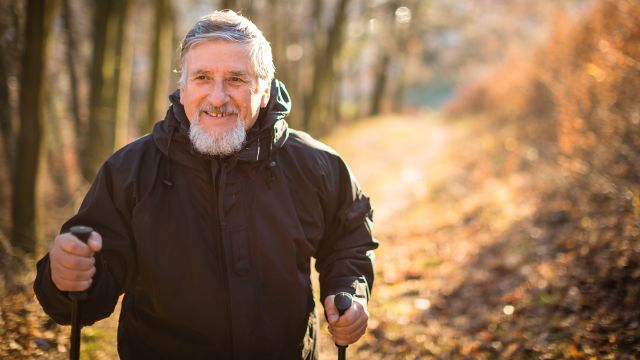Updated on February 14, 2023.
Would you like to improve your sexual health and lower your risk of prostate cancer in the process? The answer may be as simple as taking a walk. Getting regular physical activity is one of the most powerful things you can do to help prevent erectile dysfunction (ED) and support prostate health.
Moving more to prevent ED
Impeded blood flow in your arteries and veins can lead to ED. But exercise can help keep the veins and arteries in your body healthy and improve blood flow, all the way down to the penis.
To help prevent ED, the National Institute of Diabetes and Digestive and Kidney Diseases recommends that you exercise at least 30 minutes per day most days of the week. Aim for at least 150 weekly minutes of moderate-intensity exercise, like walking, light jogging, swimming, or bicycling.
Other key steps to help improve your cardiovascular health and reduce the risk of ED include:
- Quitting smoking (if you smoke)
- Following a healthy diet rich in whole grains, fruits and vegetables, lean proteins, and healthy fats like those found in fish, nuts, and vegetables. At the same time, reduce your intake of saturated fat, added sugar, sodium, and alcohol.
- Maintaining a healthy weight (which flows from getting regular exercise and eating healthfully)
- Avoiding the use of illegal drugs
New to exercise? Check with a healthcare provider (HCP) about what sorts of activities may be safest for you as you part of an overall wellness plan.
Managing ED you might already have
Do you have existing issues with erectile dysfunction? The key to resolving it may be to work on managing your weight.
Among people who were overweight or obese, weight loss helped improve sexual function, according to a review of research published in 2022 in Andrologia that looked at five studies on the topic of weight and ED.
Obesity is linked to several potential causes of ED, including lower levels of testosterone, inflammation, anxiety and depression, and higher levels of certain compounds in the blood that harm DNA and cells. Losing weight could help improve all these health markers.
Improving prostate health in the process
Regular workouts may also help you prevent something even more serious: prostate cancer.
Higher levels of physical activity have been associated with a decreased risk of developing many cancers, including prostate cancer. And people who are diagnosed with prostate cancer may be less likely to have an aggressive form of prostate cancer if they are physically active. Engaging in physical activity after diagnosis may lower the risk of dying from the disease, so it’s never too late to get started.
Exercise may help suppress tumor growth, but more research is needed to determine why. Some experts believe it may have to do with the way that exercise can change how genes turn off and on, as well as the positive effect exercise has on hormone levels, the immune system, and levels of inflammation.
As is the case with ED, adding exercise into an overall lifestyle that includes a healthful diet, maintaining a healthy weight, reducing alcohol, and quitting smoking can help you reduce your overall risk of prostate cancer.
Consider these just a few more compelling reasons to take a few extra steps every day.







